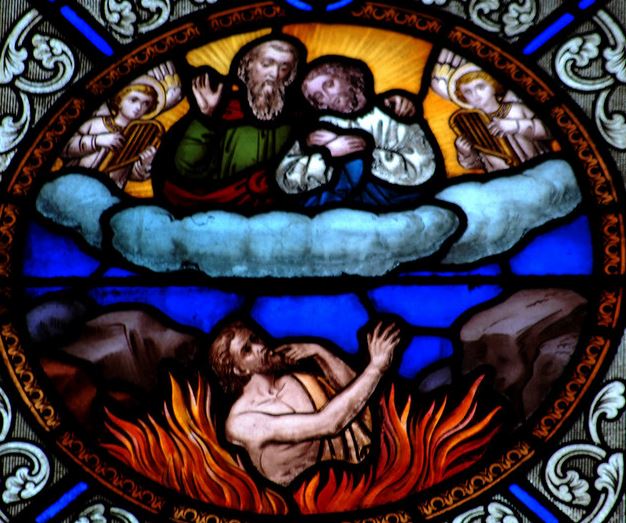- May 19, 2015
- 125,549
- 28,532
- 75
- Country
- United States
- Gender
- Male
- Faith
- Christian
- Marital Status
- Single
- Politics
- US-Libertarian
This is a spinoff from another thread that is closed:
Rich-man and Lazarus True story or Parable
Why do some commentators view the Rich Man and Lazarus parable of Luke 16 as of the most misunderstood parables in NT?
If I am understanding this correctly, it appears it is more of a covenantle story between the OC[Moses] and NC[Jesus]
LUKE 16:26 " 'And besides all this, between us[NC Jesus/Spirit?] and ye[OC/Moses/Carnal?] there is a great gulf fixed,
so that those who want to pass from here to you cannot, nor can those from there pass to us.' "
LUKE 16:29 "Abraham said to him, 'They have Moses and the prophets;
let them hear them.' "
Lazarus and the Rich Man - Here a little, there a little - Commentary
The parable of Lazarus and the rich man has been the foundation for many of the erroneous beliefs about "hell" within traditional Christianity. Some have viewed it not as a parable, but as a true story Yeshua told to give details about the punishment of sinners in hell.............
CONCLUSION
The parable of Lazarus and the rich man, long used by mainstream Christian ministers to teach the "reality of hell," really has nothing to say about punishment or reward in the afterlife.
Yeshua used this story, which fit the common misconception about life after death in his day, to show the fate that awaited the Jewish nation because of the unbelief and faithlessness which caused them to reject him as the Messiah.............
===========================
Kindgdom Bible Studies Template Page
The story of the rich man and Lazarus is without doubt one of the most misunderstood of all the stories in the Bible. Is it a parable, or an actual statement of facts concerning life beyond the grave? It is strenuously denied by most evangelists that this story, as told by Christ, could be a parable. They hold that this is not a parable because it starts out in narrative form. Yet it is generally conceded that the story of the prodigal son is a parable and all the fundamentalist preachers love to preach from its beautiful figures, thus applying it as a parable.
=================
.................................................

Rich-man and Lazarus True story or Parable
Why do some commentators view the Rich Man and Lazarus parable of Luke 16 as of the most misunderstood parables in NT?
If I am understanding this correctly, it appears it is more of a covenantle story between the OC[Moses] and NC[Jesus]
LUKE 16:26 " 'And besides all this, between us[NC Jesus/Spirit?] and ye[OC/Moses/Carnal?] there is a great gulf fixed,
so that those who want to pass from here to you cannot, nor can those from there pass to us.' "
LUKE 16:29 "Abraham said to him, 'They have Moses and the prophets;
let them hear them.' "
Lazarus and the Rich Man - Here a little, there a little - Commentary
The parable of Lazarus and the rich man has been the foundation for many of the erroneous beliefs about "hell" within traditional Christianity. Some have viewed it not as a parable, but as a true story Yeshua told to give details about the punishment of sinners in hell.............
CONCLUSION
The parable of Lazarus and the rich man, long used by mainstream Christian ministers to teach the "reality of hell," really has nothing to say about punishment or reward in the afterlife.
Yeshua used this story, which fit the common misconception about life after death in his day, to show the fate that awaited the Jewish nation because of the unbelief and faithlessness which caused them to reject him as the Messiah.............
===========================
Kindgdom Bible Studies Template Page
The story of the rich man and Lazarus is without doubt one of the most misunderstood of all the stories in the Bible. Is it a parable, or an actual statement of facts concerning life beyond the grave? It is strenuously denied by most evangelists that this story, as told by Christ, could be a parable. They hold that this is not a parable because it starts out in narrative form. Yet it is generally conceded that the story of the prodigal son is a parable and all the fundamentalist preachers love to preach from its beautiful figures, thus applying it as a parable.
=================
.................................................

Attachments
Last edited:



